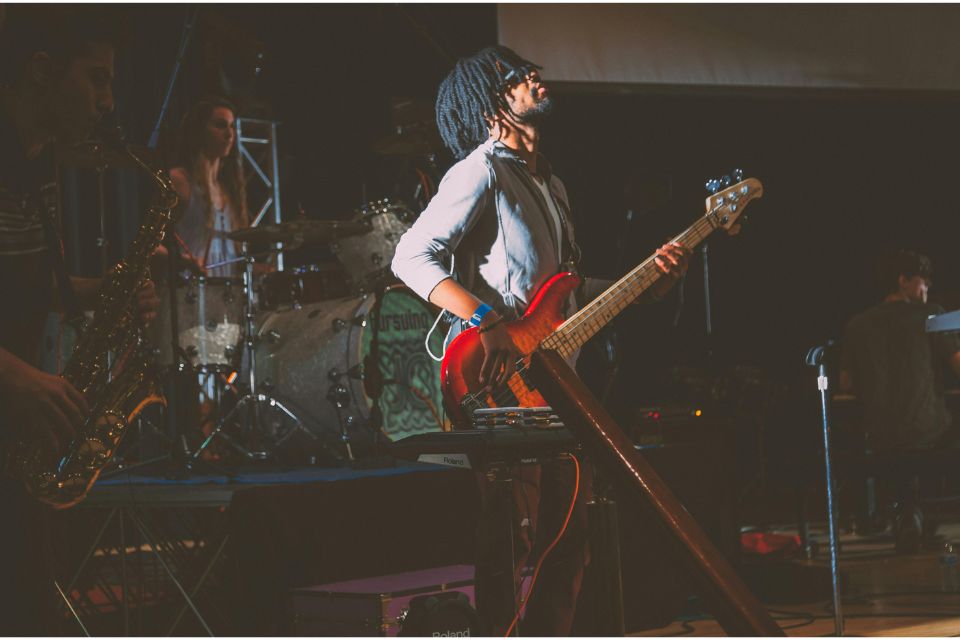Tinnitus is the experience of a persistent ringing, buzzing, or hissing in the ears and unfortunately, it can be a very common and very real concern for musicians.
For some, this can be a temporary experience, lasting anywhere from a few hours to a few weeks. But for others, this can become a chronic and ongoing issue.
Musicians depend on properly perceiving sound and picking up on the subtle differences between pitch and tone, making the emotional and psychological impacts of tinnitus all the more complicated.
With an increased risk for tinnitus, it is important for musicians to understand the prevention and management strategies available to them. Armed with this understanding, musicians can take control of their hearing health and practice their craft for years to come.
Understanding Tinnitus in Musicians
The leading preventable trigger of tinnitus is noise exposure, which can result in symptoms varying from tolerable to significantly life-altering, depending on the extent of damage to your ears.
Musicians, in particular, face a heightened risk of tinnitus. Their frequent exposure to loudspeakers and amplifiers puts them at a four times higher likelihood of experiencing noise-induced hearing loss compared to the general population. Additionally, they are 57 percent more prone to developing tinnitus.
Strategies for Preventing Tinnitus in Musicians
The good news is that there are strategies musicians can employ that may reduce their tinnitus risk. Here are some things to consider:
Seek Regular Check-Ups with an Audiologist
Regular check-ups with a specialized audiologist are essential for staying on top of your hearing health. This can help you identify signs of hearing loss or identify the need for a tinnitus hearing evaluation.
Your audiologist can also help you identify hearing care strategies and hearing protection options that suit your specific lifestyle and hearing health needs.
Sound Management at Rehearsals and Performances
Whenever possible, take steps to manage sound levels at rehearsals and performances. This can mean adjusting monitor levels, taking hearing breaks, or changing your position to establish a safer distance from speakers. Before going on stage, wearing hearing protection will extend the safe permissible time.
Customized Hearing Protection for Musicians
The first line of defense against hearing loss and tinnitus is hearing protection.
Musicians require a customized approach so they can practice without dulling the ability to hear the subtleties of pitch and tone.
Customized hearing protection for musicians preserves the richness of sound while filtering out the more harmful frequencies, allowing musicians to perform and work effectively without risking hearing health.
Management Tips for Musicians with Tinnitus
For those already afflicted, here are some strategies available for managing tinnitus.
Lifestyle Changes
Consider reducing caffeine intake, eating a balanced diet, getting regular exercise, and ensuring proper sleep.
Stress and anxiety have been known to exacerbate tinnitus symptoms, so relaxation and stress reduction techniques can also be helpful.
Cognitive Behavioral Therapy (CBT)
Cognitive behavioral therapy (CBT) has been identified as an effective strategy for managing tinnitus.
CBT can be used to reframe negative emotions and thought patterns linked to tinnitus, reducing the emotional weight of the experience. A CBT specialist can equip you with valuable coping strategies that allow you to regain a sense of control and develop a more positive approach to tinnitus management.
Sound Therapy
Sound therapy uses soothing sounds like white noise or nature to improve the auditory environment.
Like masking devices, this technique attempts to distract people from their symptoms, making them less noticeable and distressing.
Both sound therapy and masking devices require an audiologist for maximum effect. A professional audiologist can help evaluate your tinnitus and provide suggestions for treatment.
Lenire Treatment for Tinnitus
Lenire is a treatment device used to soothe tinnitus symptoms. The primary parts of the device are Bluetooth headphones, a tonguetip, and a controller.
The headphones play customized sounds that activate the auditory nerve to the brain. The tonguetip delivers gentle pulses to the tongue. The sounds and the pulses work together to retrain your brain, helping to reduce the impact of tinnitus on your daily life.
The controller allows you to adjust volume and tongue stimulation, as well as start, pause, and resume a treatment session.
The device settings are customized and set by your hearing care specialist after an assessment to ensure the device meets your specific needs.
Chicago Hearing Services is the first trained and certified provider of Lenire treatments in Chicago. Contact us to discover if this is the right treatment for you.
Support and Resources For Musicians with Tinnitus
In your journey toward tinnitus relief, there is no need to walk alone.
Support groups for tinnitus offer individuals a valuable sense of community, empathy, and practical guidance. Through the exchange of personal experiences and coping mechanisms, attendees often experience reduced isolation and gain a greater sense of empowerment in managing the distinctive hurdles posed by tinnitus.
The American Tinnitus Association offers both online and in-person support groups.
The Hearing Health Foundation offers abundant resources and local audiologists, like Chicago Hearing Services, have resources, knowledge, and expertise that can support you in your quest for tinnitus relief.
Chicago Hearing Services: Delivering Tinnitus Management for Musicians
While tinnitus may present unique challenges to musicians, with the right support, preventative measures, management techniques, and the care of an excellent audiologist, you can reduce your symptoms and continue to pursue your music.
If you are a musician or music industry worker who would like to be evaluated for tinnitus or hearing loss, please do not hesitate to contact us at Chicago Hearing Services.





